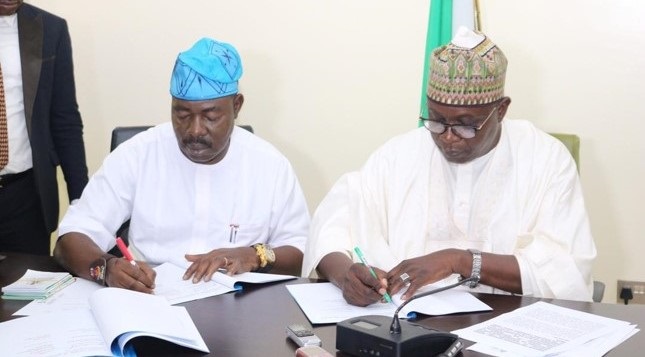The National Biosafety Management Agency (NBMA) says it will not allow any unsafe genetically modified organisms (GMOs) that will affect human health and the environment into the country.

Dr Rufus Egbeba, the agency’s Director-General, gave the assurance at the signing of Memorandum of Understanding (MoU) with the Federal Ministry of Agriculture and Rural Development on the regulation of animal biotechnolgy on Tuesday, July 2, 2019 in Abuja.
Egbeba said the agency was structured to meet national and global needs on safe use of modern biotechnology.
“I assure Nigerians that the agency will not allow any GMO that is not safe to our environment and to affect human health. We are committed to the vision of this administration.”
According to Egbeba, the fear among Nigerians is not unconnected with trade wars in the biotech sector, particularly in the hydro-chemical sub-sector.
“My coming here is to assure you that the agency has what it takes to ensure that the products of modern biotechnology are safe in our environment and to human health.
“Our coming here is to sign a better understanding and to assure you that you need not be afraid because a certain group of people are spreading rumour that GM products are harmful.
“And this is not unconnected with trade wars between the biotech sector and the hydro chemical sectors,” he said.
Egbeba said that the agency, apart from ensuring the safety of GMOs, was also interested in the socio-economic benefits of modern biotechnology.
“In a situation where you are coming out with crops that are insect resistant or pest resistant, and disease resistant, it means they will make use of less chemicals.”
The director-general said that the MoU would give the agency and the ministry the opportunity to work in synergy to build partnerships and bridges for the enhancement of food security in the country.
Dr Mohammed Bello, the Permanent Secretary in the ministry, said the MoU marked the onset of the much-needed collaboration to ensure only approved animal GMOs were imported into the country.
Bello said that the ministry would make it a prerequisite to issue import permit for only GMOs of animals that had been certified safe by the agency.
“I wish to unequivocally say that this collaboration between the ministry through the Department of Veterinary and Pest Control Services and NBMA is apt and necessary to bring about the effective regulation of modern biotechnology.”
He encouraged other MDAs to see it as a point of duty to collaborate with relevant agencies in carrying out their mandates.
Dr Olaniran Alabi, the Director, Department of Veterinary and Pest Control Services of the ministry, had earlier said that modern biotechnology posed certain challenges despite its benefits.
“These challenges are largely determined by how, when and where it finds application.”
Alabi described the collaboration as important to ensure that the use of the application of genetically modified animal and animal products was properly regulated.
The NBMA, in a related development, signed an MoU with the Nigerian Customs Service Board (NSCB) on effective regulation of genetically modified products at the nation’s borders.
According to the agency, the MoU was aimed at ensuring that importers and exporters of GMOs and their products complied with the terms and conditions of NBMA permit, NBMA Act (2015), Biosafety regulations, Biosafety guidelines and other relevant extant laws.
The MoU, it was gathered, also provides for the impounding of GMOs or their products imported or exported without biosafety permit.
“As part of the agreement, both parties shall involve each other in the review of all regulatory laws relating to biosafety and ensure that areas of cooperation, monitoring of ports and borders are in synergy between them.
“The MoU is expected to foster collaboration between the agency and the Nigerian Customs Service Board for effective regulation of genetically-modified organisms and their products.
“It is expected to reduce and/or eliminate the smuggling and piracy of GMOs in Nigeria through joint activities,” NBMA said.
By Okeoghene Akubuike
